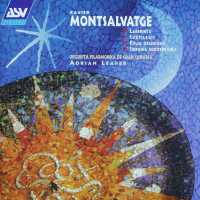|

A dramatic musical imagination

PATRIC STANDFORD listens to orchestral music
by Xavier Montsalvatge
There is not a great deal we know about 20th century Spanish music; we
hear so little of it. The operatic efforts of Felipe Pedrell, who died in
1922 having worked like a Spanish Glinka to create a national identity out
of all the Oriental, Moorish, Basque, Arab and Turkish cultural invasions
and the spicy Catalan Provençal minstrelsy, were rewarded only by
relative obscurity. He left a legacy that was quickly taken up by the next
generation, Albeniz, Granados, Conrado del Campo who proved more able operatically,
and de Falla. None were much concerned with their benefactor; but Pedrell,
who wanted to be a sort of Spanish Wagner, was not (as far as can be judged
by the texts) a very strong composer. That next generation was far better.
And after them came Rodrigo, Mompou, the exiles Oscar Esplá and Roberto
Gerhard, and the latter's pupil Joaquim Homs. Among these is also Xavier
Montsalvatge, a composer whose creative journey from the 1940's to the present
day has travelled from an unashamed romanticism to an intriguingly Spanish
Indian flavoured serialism.
Attentive viewers of that stunning Cecelia Bartoli recital recorded in
March 1998 and shown on BBC 2 last winter will have caught a glimpse of
this elder statesman of Spanish music, long living as so many are, celebrating
at the time his 87th birthday. Not only is it rare to see the great man
(reference books are economical with both photographs and information),
but it is as rare to hear anything more than those 'Five Negro Songs' which
Bartoli performed with remarkable skill, ease and vivacity. Like Rodrigo
and his guitar concerto, the popularity of those songs, published in 1945,
overshadows subsequent and perhaps more musically significant works. They
have led to the assumption, even now, that he is the composer of instrumental
and vocal miniatures, children's pieces and arrangements of national dance
tunes. Such conveniently easy dismissal is the delight of idle historians
and critics whose opinions are presumption rather than real research.
 This very
welcome CD of substantial orchestral music demonstrates well that Montsalvatge
is far more than an incidental miniaturist. His output since those early
songs, made popular by the dedicated commitment of Victoria de los Angeles,
has included 20 ballet scores and three notable operas, from which long
experience comes a dramatic musical imagination clothed in colourful orchestration,
particularly evident in the two major works recorded by the Orquesta Filarmonica
de Gran Canaria and their enterprising British conductor Adrian Leaper. This very
welcome CD of substantial orchestral music demonstrates well that Montsalvatge
is far more than an incidental miniaturist. His output since those early
songs, made popular by the dedicated commitment of Victoria de los Angeles,
has included 20 ballet scores and three notable operas, from which long
experience comes a dramatic musical imagination clothed in colourful orchestration,
particularly evident in the two major works recorded by the Orquesta Filarmonica
de Gran Canaria and their enterprising British conductor Adrian Leaper.
Continue >>
Copyright © Patric Standford,
October 30th 1999
 CD and purchase information
CD and purchase information
 |
To listen to the aural illustrations in this review,
you may need to download RealNetworks' realplayer G2. |
<< Music &
Vision homepage Company
>>
|